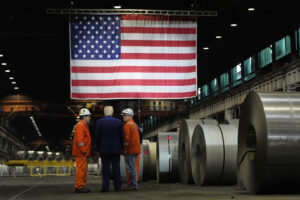Reconciling Ideology: In Between NYC and Nowhere

A Soviet passport belonging to author's mother | provided by author

The majority of Russian-Americans were thrilled by Trump’s familiar rhetoric, isolationism, and friendly view of Russia and Putin, and they were equally delighted when he won the presidency. They consider themselves ‘Americans,’ just as my Soviet Jewish émigré parents do. But on election night, the naïve illusion my parents held as self-proclaimed ‘Americans’ was shattered. Despite their white skin—evidently a prerequisite in Trump’s America—and strong work ethic, no one told them that they aren’t really ‘Americans,’ or at least that they don’t fit into Trump’s definition.
As a first-generation daughter who grew up in a Soviet émigré home in NYC, the past election and onslaught of the Trump administration has born an ongoing reconciliation of imaginaries—one’s self-perception in society, which informs behavior and experience to the extent that it becomes reality. Thus, in order to understand the belief system of Russian-Americans in Trump’s America, one must observe reflexively.
Unlike many refugees from the former Soviet Union, my parents would never have left had it not fallen apart. Growing up in the 70s, they thrived in the former USSR territory of Uzbekistan. Their passports were stamped with ‘Jew’ and ‘Jewess’ under the Soviet nationality clause, their parents had to change their last names under Stalin in order to receive honors on their diplomas, but in their eyes, they were all Soviets. They had food on the table, an apartment provided for, a revolving door of friends, both Uzbek and Russian. And they had their youth. Sometimes I wonder if their nostalgia for the USSR is rooted in their childhood, the dignity and prestige associated with their engineering and medical careers, or simply a sentimentality for what is now lost. In any case, life in Soviet Uzbekistan, far from the metropole of Moscow, was quiet and dignified. So when the unthinkable happened—when the USSR fell apart—they filed for refugee status, and were instantly subjected to states, borders, and institutions that would change and dictate the course of their fate.

The so-called American Dream was not something my family ever strived for, but rather became a by-product of. Stuck between two grand historical narratives, my parents left the Soviet utopian project that had failed them to embrace the American zeitgeist thrust upon them as refugees. It was their only option for survival. In reconciling a severed past from future, only the connective tissue of opportunism has united their lives in the Soviet Union and NYC.
Back in Soviet Uzbekistan, my father was a member of the Communist Party—not for idealistic reasons, but in order to get promoted in his career. He still says my mother was not in the Party because she was too young to join before it fell apart, and my mother always laughs knowingly. A mix of wistfulness and irony, they share a nostalgia for their days in the Komsomol, a state-sponsored communist youth organization, that shipped them out to the country en masse for mandatory ‘educational’ cotton-picking. Make no mistake, no one was under the preconception that the utopian age of Communism would dawn on the USSR by 1988, as it was written in my mother’s history textbooks. But the nights of drinking homemade vodka in the fields, surrounded by friends, brings back happy memories that capture the texture of their former lives. “Lenin is more alive than us,” they would joke. Ironic and complacent, at least they were all in it together. Now they understand that their cotton-picking field trips doubled as free labor for the State.
In America, my father transitioned from socialist to republican. This was a strategic move—another survival tactic. As someone who officially came to this country on refugee status and received public aid, food stamps, and welfare in the early years of his immigration, my father’s disdain for anything that resembles a socialist power structure always confused me. What’s more, he continued to fiercely defend the Soviet Union whenever questioned.
But the paradox is independent of ideology: “We are right-leaning not because the Soviet Union failed us, but because the Soviet Union failed,” my father says. He did not change, only his environment did. The only way he could reclaim agency in the face of tectonic historical shifts and imposed power structures was to focus on himself as an individual. Political apathy became a privilege.

But political activism is also a privilege. My parents did not vote for Trump because, despite their opportunism, they started to realize that they are not the ‘Americans’ whom they imagined nor the ‘Americans’ Trump spoke to in his speeches: a white working-class or those equipped with a genealogy that traces back to the Mayflower. My parents cannot and will not have roots in this country—they were ‘Jews’ in the Soviet Union much like they are ‘Russians’ in America. And besides, they’ve heard it all before—autocrats speak the same imaginaries, whether they are based in a mythical past or mythical future. As for the overwhelming 59.35 percent who went red in Brighton Beach this election—the only neighborhood in Brooklyn to vote majority Republican—these pro-Trump Russian-Americans are not ‘Americans’ either. It’s just that no one has told them yet that they are not invited to Trump’s America.
Milana Meytes is a Master’s student at NYU’s Graduate School of Arts and Sciences. She studies diaspora, memory and literature at Draper’s interdisciplinary humanities program. Her thesis focuses on a 20th century Russian Emigre Archive in Prague that weaves together the connections between nationalisms, memory and historicity. Milana was born in a dwindling Soviet Union, current day Uzbekistan and grew up in Washington Heights, NYC. She started exploring her family history through memoir and later poetry at Wheaton College, MA. Creative writing and NYC are her first loves and homes; she hopes to create a home in writing for diasporic and refugee populations in NYC through teaching.





If you ask me, no one got conned more than Putin. He fell for Drumpf’s lip service hook, line and sinker.